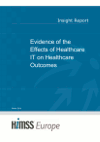 A study by the analytics division of HIMSS UK has, for the first time, highlighted a correlation between the maturity of IT within NHS hospitals and improvements to patient outcomes. The research, which combines data from 91 NHS hospitals in England together with HIMSS Europe's proprietary EMRAM capability data (Electronic Medical Record Adoption Model) demonstrates that those hospitals that have a score of EMRAM Stage 4 and above, have a lower Summary Hospital-Level Mortality Indicator (SHMI).
A study by the analytics division of HIMSS UK has, for the first time, highlighted a correlation between the maturity of IT within NHS hospitals and improvements to patient outcomes. The research, which combines data from 91 NHS hospitals in England together with HIMSS Europe's proprietary EMRAM capability data (Electronic Medical Record Adoption Model) demonstrates that those hospitals that have a score of EMRAM Stage 4 and above, have a lower Summary Hospital-Level Mortality Indicator (SHMI).
John Rayner, Director of Professional Development, HIMSS UK said the findings are a key justification of the investment in healthcare IT going forward: "This report asks us to accept as a general principle that hospitals that are more digitally mature can provide greater levels of patient safety and are more productive than hospitals that have not made investments in technology."
"The indicators that have been used as evidence are the foundations of a more compelling case on which we will build on but the report provides some real and long-awaited assurances that IT investment has absolute links to improving patient care and quality."
In addition to a decline in mortality rates, the study titled 'Evidence of the Effects of Healthcare IT on Healthcare Outcomes,' also found evidence of a positive correlation between EMR capabilities and imaging workflow performance, whereby digitised imaging departments were more efficient and effective at staying on top of workflow management.
In terms of patient feedback and only by a slight margin, hospitals tending towards a higher EMRAM score performed consistently better than their counterparts with lower EMRAM scores for treatment-related patient satisfaction questions.
Stephen Lieber, President and CEO of HIMSS added: "The correlation between these findings will come as no surprise to many of those working in healthcare IT. But for clinicians and patients alike they have the potential to encourage a real step-change in the attitudes towards the benefits of technology, meanwhile assisting professionals in building robust business cases.
"Interestingly, the study also highlights that only when a hospital has the fundamental building blocks in place such as an electronic patient record system and electronic clinical documentation and has reached HIMSS Stage 4, will it start to see these types of clinical benefits, demonstrating that in order to reap the rewards, IT must be a long-term and progressive investment."
Download: Evidence of the Effects of Healthcare IT on Healthcare Outcomes (.pdf, 507 KB).
Download from eHealthNews.eu: Evidence of the Effects of Healthcare IT on Healthcare Outcomes (.pdf, 507 KB).
About HIMSS Analytics
HIMSS Analytics collects, analyses and distributes essential health IT data related to products, costs, metrics, trends and purchase decisions. It delivers quality data and analytical expertise to healthcare delivery organisations, IT companies, governmental entities, financial, pharmaceutical and consulting companies.
HIMSS Analytics is a part of HIMSS, a cause-based global enterprise that produces health IT thought leadership, education, events, market research and media services around the world. Founded in 1961, HIMSS encompasses more than 52,000 individuals, of which more than two-thirds work in healthcare provider, governmental and not-for-profit organizations across the globe, plus over 600 corporations and 250 not-for-profit partner organizations, that share the cause of transforming health and healthcare through the best use of IT. HIMSS, headquartered in Chicago, serves the global health IT community with additional offices in the United States, Europe, and Asia.
About HIMSS
HIMSS WorldWide is a cause-based, not-for-profit global enterprise that produces health IT thought leadership, education, events, market research and media services around the world. Founded in 1961, HIMSS WorldWide encompasses more than 52,000 individuals, of which more than two-thirds work in healthcare provider, governmental and not-for-profit organizations across the globe, plus over 600 corporations and 250 not-for-profit partner organizations, that share this cause. HIMSS WorldWide, headquartered in Chicago, serves the global health IT community with additional offices in the United States, Europe, and Asia.
HIMSS WorldWide has commissioned this report from Bilue, a London-based research & consulting start-up specializing in data-driven marketing and strategy solutions for the healthcare and biosciences markets.